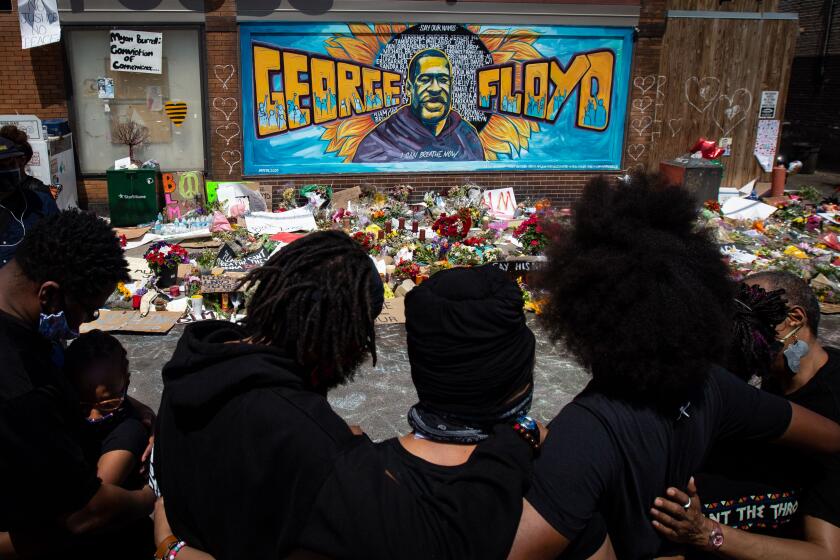Review: Yefim Bronfman is up to speed
- Share via
Yefim Bronfman’s recital at Walt Disney Concert Hall on Wednesday night was bookended by monumental Brahms and Prokofiev sonatas that the popular Uzbek pianist with a massive technique made much of. The occasion will gladly be remembered as the example of a prodigious performer in action, increasingly willing to plumb music’s soul.
There were also two little pieces in the middle. One was Schumann’s “Arabeske,” which flew by as if on gossamer wings, Bronfman’s brawny fingers seeming somehow to barely brush the keys, as though there were nothing to it. The other six-minute piece was Esa-Pekka Salonen’s “Sisar,” written for Bronfman and receiving its world premiere.
PHOTOS: Arts and culture in pictures by The Times
Buried as it was on the program, the new score felt a fairly low-profile premiere for Salonen. The composer remained in London, where he was conducting his Philharmonia Orchestra. Even the top brass of the Los Angeles Philharmonic, which commissioned “Sisar” and sponsored the recital, weren’t on hand. They’re in Germany, apparently cooking up something with the Berlin Philharmonic, which Gustavo Dudamel is guest conducting.
Wednesday will be remembered as well for “Sisar,” which Salonen describes as the last in a series of five piano etudes and the most difficult. In it, Bronfman covers the keyboard like an ace sleuth leaving no corner unturned while trying to keep out of sight, for the most part. A dozen years ago Salonen wrote a two-part solo piano piece, “Dichotomie,” for L.A. pianist Gloria Cheng that often puts the exciting, hugely virtuosic rhythmic material up front. The more understated “Sisar” picks up a few of those Schumann gossamer wings and glides past the listener.
It glides rapidly, with a considerable amount of regular eighth-note figuration. Parts of it are like a Bach two-part invention. The tricky syncopations aren’t that odd for a 21st century composer. But the speed of “Sisar” changes everything. The twists and turns go by so fast that, at least on first hearing, the sensation is one of continual surprise. You may think you know where this music is headed, but you never do.
Bronfman played the new score with exceptional grace and, for a sly piece, with a sly grace as well. “Sisar” means “sister” in Finnish and “to steal” in Spanish. The work is a sister score to Salonen’s latest orchestral work, “Nyx,” a mysterious piece he conducted last month at Disney and from which he pilfered a passage or two. Then he paired “Nyx” with Schumann (the piano concerto), so Bronfman’s pairing “Sisar” with Schumann’s “Arabeske” made sense.
The recital opened with Brahms’ Third Piano Sonata, written when the composer was 20. It is, to a much greater degree, Schumann-infused but with the personality of the young composer proudly bursting forth, and sometimes too proudly. Brahms was showing off, and he had a lot to display. Bronfman, who has long favored this sonata, barreled through it, when barreling through was just what was needed (and also was hugely impressive). But he seemed most at home with Brahms’ equally pretentious young man’s excessive lyricism, which under Bronfman sounded exquisite.
Prokofiev’s somber and beautiful Eighth Piano Sonata is a wartime work written by the Russian composer in 1944 when the prospects for peace were uncertain. Bronfman’s lyricism was darkly commanding and revealing of a new somber delicacy. A year ago, he broke a finger smashing out Prokofiev’s flashier Seventh Sonata in Berkeley (he had to cancel a concerto appearance at the time with Dudamel and the L.A. Phil).
Perhaps that has intimidated the 54-year-old pianist from taking quite so many physical chances. Perhaps he has simply become more introspective than when he recorded the sonata a couple of decades ago. But this was as compelling — physically, emotionally and, most important, spiritually — a performance of the half-hour score as I have heard.
Forget the small Schumann or the early Brahms; it was here, in an honest, unhesitatingly profound performance of honest, profound music that Salonen’s “Sisar” found the kind of bigger, older sister in whose company there can be no filching.
MORE
INTERACTIVE: Christopher Hawthorne’s On the Boulevards
VOTE: What’s the best version of ‘O Holy Night’?
PHOTOS: Arts and culture in pictures
More to Read
The biggest entertainment stories
Get our big stories about Hollywood, film, television, music, arts, culture and more right in your inbox as soon as they publish.
You may occasionally receive promotional content from the Los Angeles Times.











